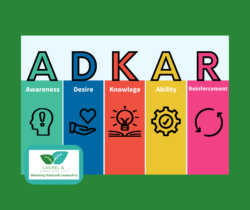
Tip #1036: The ADKAR Model of Change Management
Change happens at the individual level. In order for a group or organization to change, all individuals within that group or organization must change. This
GIVE YOUR MANAGERS THE SKILLS TO BE EFFECTIVE AND SET THEIR EMPLOYEES UP FOR SUCCESS
84% of U.S. workers say that poorly trained managers create a lot of unnecessary work and stress. Is this true of your managers?
Laurel and Associates, Ltd. can help you build managerial, employee development and technical skills through the design and delivery of participatory classroom and virtual training programs. We also provide train-the-trainer programs that will teach your trainers how to effectively design and facilitate high quality training programs.
Since 75% of employees leave their jobs voluntarily because of a poor manager, it’s a good idea to recognize the warning signs that a manager needs to learn better management and interpersonal communication skills. Otherwise, your organization cannot ensure continued growth, productivity, and profitability.
Here are eight urgent signals that your manager is not performing well:
Each of these eight indicators is an urgent signal that your managers are not performing well and need better management and interpersonal communication skills. Addressing these signals through management training can enhance an organization’s performance and profitability. An investment in management training is an investment in the current and future success of your organization.
Action: To learn more, schedule time to talk with Deborah Laurel at http://bit.ly/44yLO5l
Middle managers are the backbone of business. It’s up to them to translate policies and procedures and to manage the employee experience to ensure that programs achieve their goals and customers’ needs are met.
Employees don’t leave companies, they leave managers. And if the employees are unhappy and don’t leave, their morale and productivity plummet. You know you have a problem if your customer complaints have increased, more production deadlines aren’t being met, and your revenue is down. Can you afford for this to continue?
My name is Deborah Laurel and I’m the President of Laurel and Associates, Ltd.
If your managers are struggling and your employees are thinking of jumping ship, it will cost you 6 to 9 months of the employee’s salary to fill each vacancy.
Isn’t it time to see that your managers have the managerial and interpersonal skills they need to create a positive and productive work environment, so employees want to stay and, even better, do their best?
I bring practical experience with developing managers in a variety of different industries, based on my years as a management consultant and as an adjunct instructor in the Executive Management Institute and the Small Business Development Center in the School of Business at the University of Wisconsin-Madison.
I offer three packages to help your managers learn how to manage:
Package A is a five-day management development program that builds and reinforces necessary management skills in communication, delegation, motivation, coaching, and team building. An additional five days are scheduled a month later for follow up and reinforcement.
Five added values of this program:
Package B is a three-day management development program that builds and reinforces necessary management skills in communication, motivation, and delegation. An addtional three days are scheduled a month later for follow up and reinforcement.
Five added values of this program:
Package C is a one-day management development workshop that addresses a specific skill deficit and is selected from our menu of management courses. These include but are not limited to coaching, communication, conflict resolution, delegation, motivation, performance management, change management, and team building. An additional day is scheduled a month later for follow up and reinforcement.
Five added values of this package:
When we have worked together, you will have identified the specific concerns you have regarding your managers’ skill sets and the results you desire. Your managers will have participated in the workshops, developed the desired skills, and used them to create an engaged and productive workforce. They will have been held accountable for increasing employee morale, productivity, and retention.
Managers are not born, they’re made. If they’re not made well, your en:re company suffers the cost. You can’t afford that. Avoid having to let them go. Give them the training they need.
Let’s talk. You can schedule a mutually convenient Zoom call.

Change happens at the individual level. In order for a group or organization to change, all individuals within that group or organization must change. This

“People don’t leave bad companies, they leave bad managers.” Marcus Buckingham. Most managers aren’t born bad. “Too often, the title of manager is doled out

In previous Tips, we looked at the three major reasons why managers don’t manage: they are uncomfortable with their role and responsibilities; they lack confidence




Thank you Deb for all the great learning!!!



Get New Blog Posts in Your Inbox Weekly.